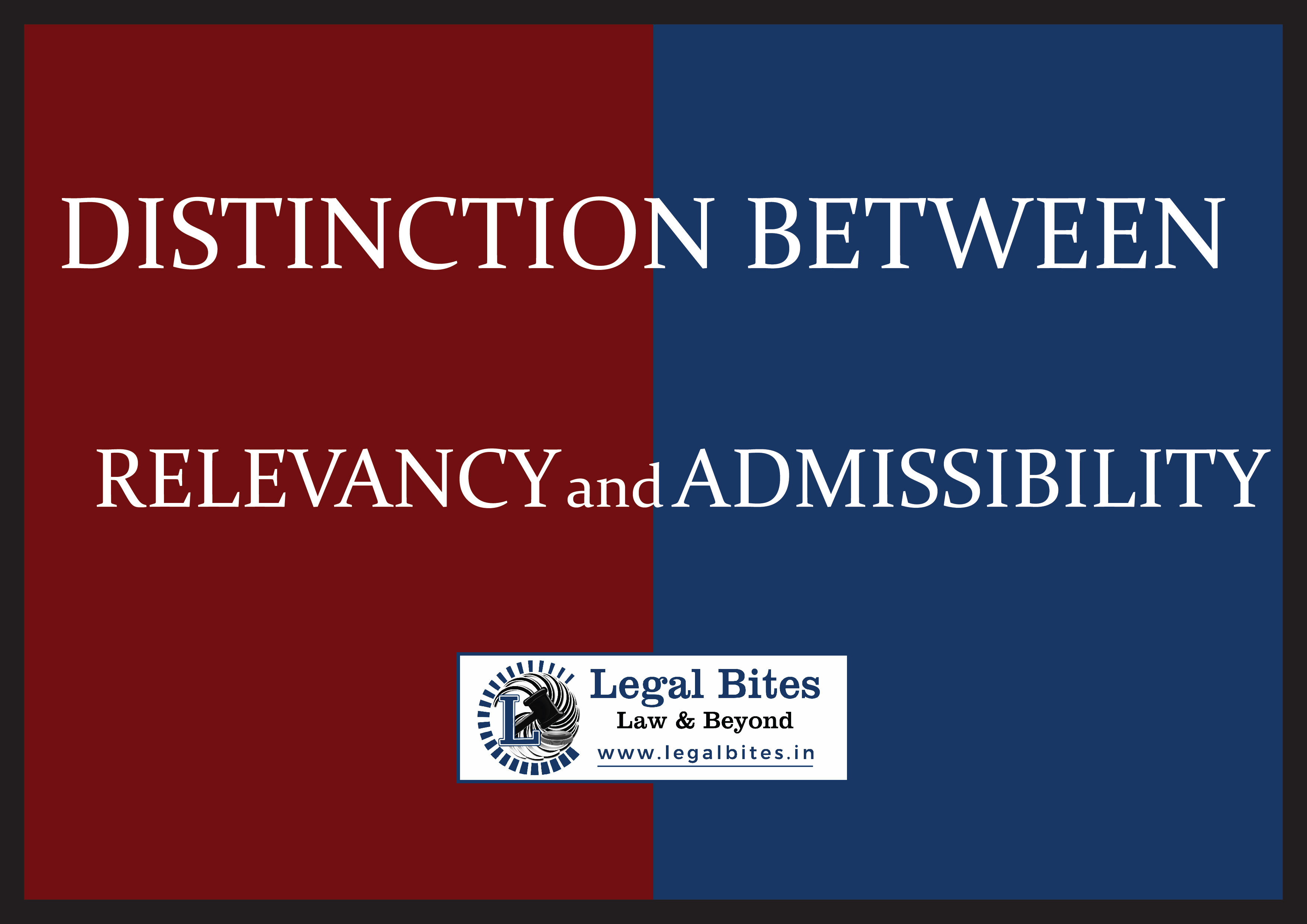Distinction between Relevancy and Admissibility
This article on ‘Distinction between Relevancy and Admissibility’ is written by Tejas Vasani and discusses the difference between the two. I. Introduction 1. Relevancy It is the ultimate touchstone for the determination of the admissibility of evidence.[1] It is due to this fundamental rule of the Law of Evidence that the terms ‘relevancy’ and ‘admissibility’ are often used interchangeably. It… Read More »

This article on ‘Distinction between Relevancy and Admissibility’ is written by Tejas Vasani and discusses the difference between the two. I. Introduction 1. Relevancy It is the ultimate touchstone for the determination of the admissibility of evidence.[1] It is due to this fundamental rule of the Law of Evidence that the terms ‘relevancy’ and ‘admissibility’ are often used interchangeably. It must be noted that both concepts are quite distinct from each other.[2]...
This article on ‘Distinction between Relevancy and Admissibility’ is written by Tejas Vasani and discusses the difference between the two.
I. Introduction
1. Relevancy
It is the ultimate touchstone for the determination of the admissibility of evidence.[1] It is due to this fundamental rule of the Law of Evidence that the terms ‘relevancy’ and ‘admissibility’ are often used interchangeably. It must be noted that both concepts are quite distinct from each other.[2] For instance, a confession made by an accused to his wife may be relevant but is inadmissible since it falls within the purview of ‘Privileged Communications’ under the Indian Evidence Act, 1872. It may be stated that all that is admissible is relevant but all that is relevant may not be admissible. Let us further evaluate the difference between relevancy and admissibility.
Section 3 of the Indian Evidence Act, 1872, defines relevancy as “one fact is said to be relevant to another when the one is connected with the other in any of the ways referred to in the ways referred to in the provisions of the Act relating to relevancy of facts.” The said provisions are contained in sections 5 to 55 of the Evidence Act.
A fact may either be logically relevant or legally relevant. Where a fact bears such casual relation to the other that it renders probable its existence or non-existence, it is said to be a logically relevant fact. For instance, where it is to be determined whether A has placed the murder weapon in the field or not, the fact that B saw A walking towards the field with the murder weapon is relevant.
The Evidence Act recognizes some of the kinds of causal relations. Thus, those kinds of causal relations which are recognized by law are known as a legally relevant fact. Therefore, while all legally relevant facts are logically relevant, all logically relevant facts may not be legally relevant. For instance, an accused gives the following statement- “I have kept in the field the knife with which I killed A.” While the statement may be logically relevant to establish the guilt of the accused, its legal relevancy extends only so far as it confirms the fact that the accused had kept the knife in the field. This is so because section 27 of the Evidence Act clearly lays down that only that part of the information may be proved which clearly relates to the fact thereby discovered.[3]
2. Admissibility
It refers to the question as to whether the court must consider a relevant fact in deciding upon the issue or not. A fact is admissible only if it does not infringe any of the rules of exclusivity provided by law. Thus, logically relevant facts are relevant but may not be admissible whereas legally relevant facts are relevant as well as admissible. Relevancy is a question pertaining to the tendering of evidence before a court of law and is for the lawyers to decide. On the other hand, admissibility is for the judge to decide since it pertains to the weight that must be attached to a piece of evidence tendered before the court.[4]
The various points of distinction may be briefly summarized as follows-
| Relevancy | Admissibility |
| Governed by logic and probability | Strictly governed by legal rules |
| All relevant facts may not be admissible | All admissible facts are relevant |
| Rules of Evidence described from sections 5 to 55 in the Evidence Act | Rules of relevancy described after section 56 in the Evidence Act |
| Rules of relevancy declare whether a piece of evidence is relevant or not | Rules of admissibility declare whether a relevant piece of evidence is admissible as such or not |
Edited by- Akriti
References
[1] Wilson v. R, [1970] HCA 17: (1970) 123 CLR 334.
[2] Sahoo v. State of U.P., AIR 1966 SC 40.
[3] Monir, M., Principles and Digest of Law of Evidence, 35 (1975); See Pulukuri Kotayya v. Emperor, AIR 1947 PC 47.
[4] Dato’ Seri Anwar bin Ibrahim v. Public Prosecutor, [2015] 2 MLJ 293.


